In an effort to improve and streamline management of clinical trials, UCLA’s Jonsson Comprehensive Cancer Center has acquired and recently launched Velos eResearch software that allows for better use of information systems and clinical databases in medical research.
A UCLA selection committee chose Velos eResearch because the system offered the best core functionality for managing clinical trials and it was the most adaptable and user-friendly for tracking patients.
“We have a very complex structure here on campus and in the TORI Network,” said Nancy Ryba, a registered nurse and administrative director of the Jonsson Cancer Center’s Clinical Research Unit. “Velos eResearch allows us to accurately track the patients and studies with the level of detail that we require. Equally important, Velos is the most user-friendly for those who work with the system. It is also the most flexible and adaptable for addressing all of our on-campus and off-campus needs.”
The system supports patient recruitment, patient scheduling, Internal Review Board and study monitoring, project planning, study design, protocol compliance, budget, invoicing, data safety monitoring, adverse event reporting, system integration and study execution.
The cancer center tracks everything from simple studies to very complex, multi-arm clinical trials that require very detailed patient information, Ryba said. Velos eResearch will also be used to track studies within the Translational Oncology Research International (TORI) network, a large group of participating research sites and medical practices stretching throughout the country, as well as some international sites.
Implementation of Velos eResearch at the cancer center began through interviews with experts in clinical trials and stakeholders at the institution. It was determined that the system would first be deployed to tackle the most important business process needs of leadership and staff.
“There are so many areas that Velos eResearch is capable of addressing,” said Courtney Martin, associate director of the cancer center’s Informatics Division, “but we chose to start with the areas of highest need.”
Improving the cancer center’s ability to manage its research portfolio was foremost among the areas of highest need. With Velos eResearch, cancer center leadership know what studies are open, how well they are accruing patients and the stage they have reached in the regulatory process.
“Managing that was always a very laborious and inefficient process for us,” Martin said. “Before Velos eResearch, it was much more difficult.”
Stakeholders and clinical trials experts helped cancer center leadership define other areas of focus for implementation. Senior leadership needed quick understanding of what was happening at the research staff level from those enrolling and interacting with patients. Those users are responsible for ensuring that all regulatory activities are carried out appropriately. They also are providing needed data to billers.
“Now our senior leadership will be able to log into the system and be able to access the data they need in real time,” said Martin.
Billing has been an equally important priority for the cancer center. With Velos, the invoicing staff will have access in real time to the patient tracking data they need for billing. Previously, fund managers spent much of their time inefficiently retrieving the necessary data from several different locations.
“Velos will help us become more efficient in the turn-around time in processing billing for clinical trials,” Martin said.
Ryba said UCLA and the TORI network have been tracking studies and patients for nearly 13 years via paper manual processes and legacy databases.
“We look forward to moving into a system that will allow us to track studies and patients real time in an efficient manner that will facilitate coordination of our clinical trials and allow accurate financial tracking of study procedures and processes,” Ryba said.
The cancer center will have the ability to electronically exchange data with the various TORI network sites. Previously, data was transmitted by email and fax and manually keyed into the old database. With the new system, the TORI sites will enter their own data directly into Velos.
“They can go online, view the studies available at their site and track their patients through Velos,” Ryba said. “Eventually, protocols and informed consents will be Web-based for all studies.”
Cancer center senior leadership will use accrual data in formulating NCI reports and for other regulatory functions such as the Internal Scientific Review Committee, Quality Assurance and the Data Safety Monitoring Board.
Leading-Edge Research Management System Launched

Related Content
Share:


